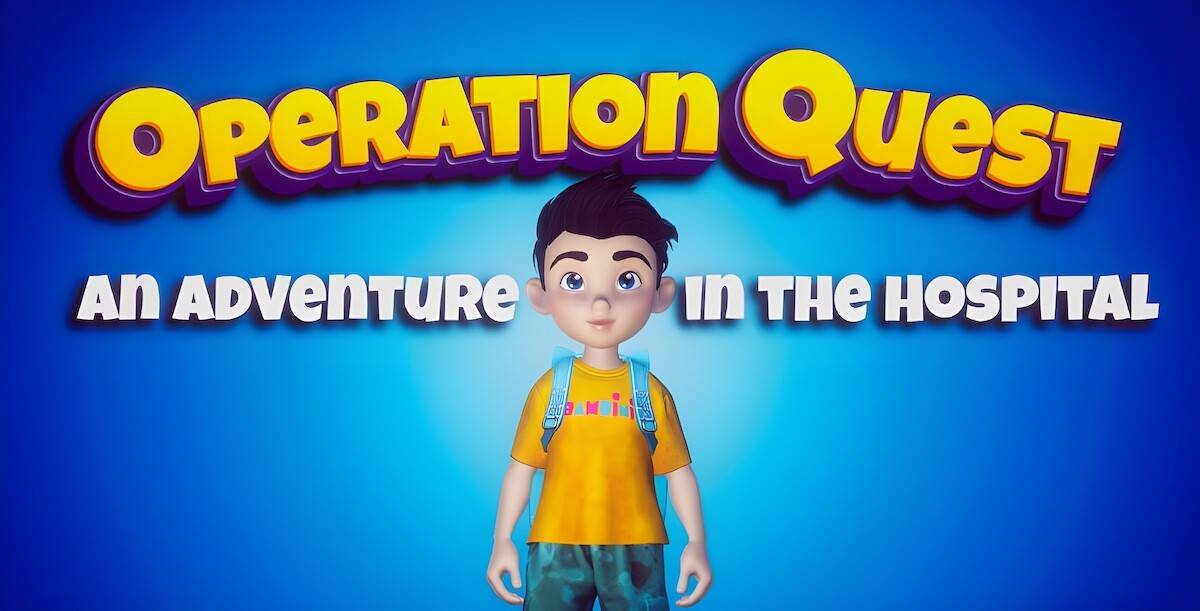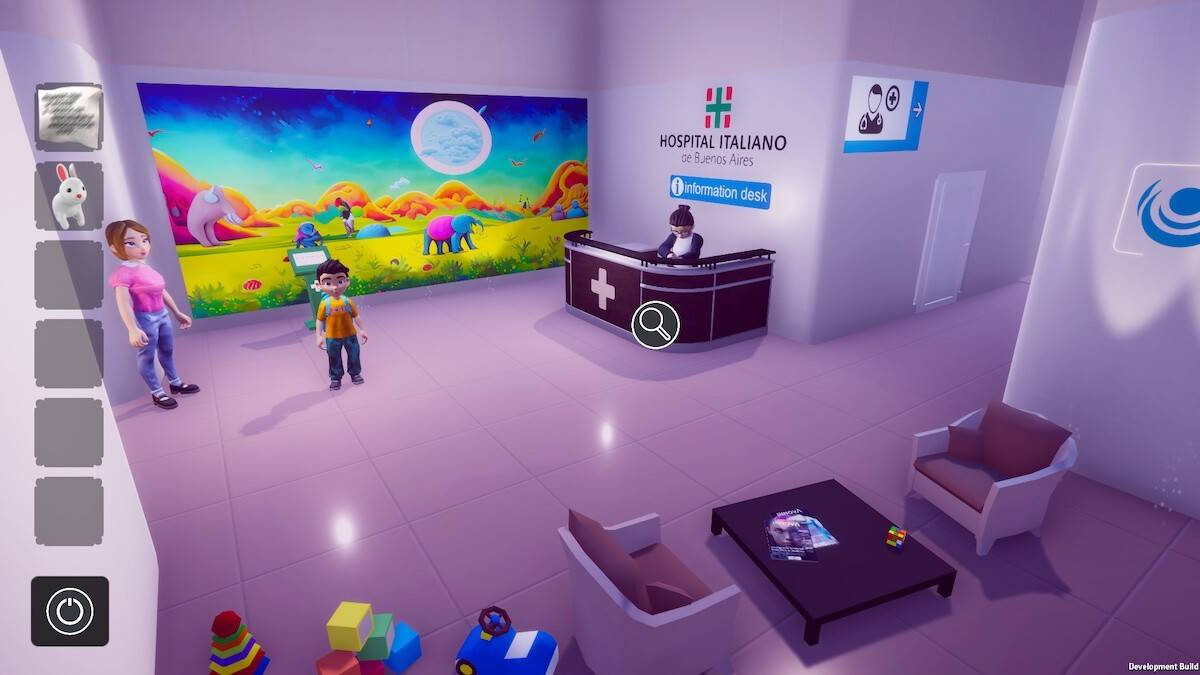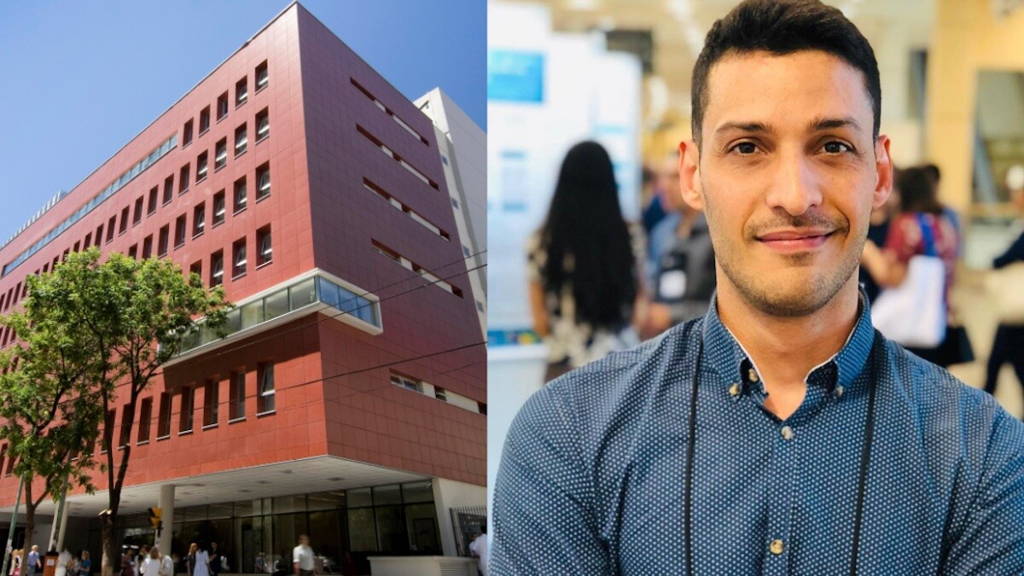The Italian Hospital of Buenos Aires has launched a game, Operation Quest, providing emotional support to children and families before surgeries. We spoke with its author, Santiago De Matos Lima, M.D., about serious games for health—a discipline that combines medical expertise with technology to enhance patient experience and medical education.
What is the Operation Quest video game?
Operation Quest is a point-and-click adventure game designed to help reduce the anxiety of children facing medical procedures, especially surgeries. It is an interactive adventure in which children accompany the protagonist, Andy, on his journey through the hospital.
Through a series of challenges and activities, children learn about the medical process and become familiar with the hospital environment, which helps them feel more confident and prepared. The main objective of the game is to provide relevant information in an accessible and fun way so that children can face their medical experiences with less anxiety and fear.
How did the idea of creating the game come about?
The idea to create Operation Quest stemmed from a combination of previous experiences. My first foray into game development happened during medical school when I created Sofia's Debt. Later, I established Artisticsoft, a company dedicated to video game development. However, I couldn't sustain the project due to my commitments as a medical student.
During the pandemic, with face-to-face events at the Italian Hospital not feasible, I conceived the idea to craft a virtual tour. This experience sparked my interest in utilizing such technology to aid patients, thus giving birth to the concept of Operation Quest.
The primary aim of Operation Quest is to tackle and diminish the anxiety experienced by children before undergoing surgical procedures. Studies indicate that between 50% and 80% of children feel anxious before surgery, prompting us to create an interactive and educational tool to bolster their confidence and preparedness through information dissemination and by fostering a space where children and their families can delve into both the practical and emotional aspects of the surgical process.
To develop the game, I collaborated with the surgical psychoprophylaxis team of the Hospital Italiano, led by Andrea Galilea and pediatrician Lucía Zerbetto.

Operation Quest was introduced in The Italian Hospital of Buenos Aires.
How did the project start?
Initially, I crafted a prototype using a real-time 3D creation tool, envisioning it as an interactive simulation of the operating room environment rather than a fully-fledged game. However, the outcome didn't quite meet my expectations.
Then, I revisited the project with a fresh perspective. Drawing inspiration from the game Eco Quest from the 90s, I took a different approach. The new vision was for a complete game—a point-and-click adventure where information would unfold within the narrative. I developed a new prototype using the Unity engine, which I presented to the hospital for approval.
Subsequently, we embarked on iterative sessions with the surgical psychoprophylaxis team to refine the game's content while progressing with its development.
What details introduced in the game were critical to making it successful?
Operation Quest resembles and operates like a traditional video game, which is crucial.
Its ability to entertain and be enjoyed by families is fundamental. Additionally, the input from the hospital's Surgical Psychoprophylaxis team was invaluable in transforming this game into a valuable tool for its intended audience. It was essential to balance gaming and informative elements, ensuring that it doesn't feel like a clinical tool but rather a game any child could engage with.
It is not just a game but a serious game grounded in research, correct?
Yes. The development of the game is conducted within a research protocol framework. Our approach is rooted in observing controlled sessions, administering structured questionnaires, and actively listening to users, all while applying user-centered design principles. This methodology enables us to create an entertaining game and an effective tool to help children confront medical challenges with confidence and calm.
For instance, upon noticing that many patients selected the "I'm scared" option at the beginning of the game, we reorganized the possibilities to better discern whether this choice was genuine or influenced by its display order. Additionally, we introduced new cut-scenes and interlude scenes with a narrative-driven approach, resulting in increased user engagement from the outset.
We also paid close attention to the game's music and the hospital's signage, as we observed that they initially evoked fear or anxiety. By making adjustments, we aimed to foster a more positive and stimulating experience. We incorporated mini-games to enhance variety and gameplay, as well as added humorous sounds and rewards to promote exploration and active participation.
Throughout the development process, we iteratively adjusted the game's flow to strike a balance between playable content and dialogue scenes, ensuring sustained player interest without overwhelming them. All these enhancements, including adjustments to the puzzle design and the virtual operation sequence at the game's conclusion, were implemented in a manner that felt seamless and cohesive.

A screenshot from the Operation Quest game.
Can you please share the feedback from the patients and the doctors?
We have received numerous comments, both via email and on download platforms. I want to highlight two of them below:
A mother wrote us: "Hello, I am a mother of two boys. I wish more specialists could come together, pooling their talents and knowledge, to provide us with more technological tools to assist our children. I applaud you for this initiative and hope to see more initiatives like this launched to help children navigate stressful situations successfully."
A psychiatrist shared their thoughts: "In every moment of the game, you can see the attention to detail and the effort put into each scene! The interactivity is impressive, offering moments of fun, relaxation, critical thinking, and learning! It fosters learning that is often challenging to convey to children in a simple and engaging manner! It's a complete innovation! Once you start playing, you won't want to stop even after finishing it!"
Besides aspects focused on improving patient care, we hope this initiative will foster greater receptivity to similar initiatives in hospitals. Thus, we decided to offer the game free of charge and make it available on Android and iOS platforms in Spanish, English, and Portuguese, ensuring accessibility for anyone who may find it beneficial.
Following the experience, in which other areas do you envision introducing similar games?
Before and after my involvement with Operation Quest, I've been studying, delving into specific literature, and pondering other domains where similar games could be introduced to enhance people's health.
For instance, imagine utilizing these games to educate individuals about crucial health topics such as nutrition, hygiene, and disease prevention. It would be akin to learning through play. Additionally, I find it intriguing to explore how games could be integrated into therapy and rehabilitation, aiding patients with physical disabilities or neurological disorders in achieving faster recovery, better adherence, and a more enjoyable experience. They could also be employed in managing chronic conditions like diabetes or asthma, teaching patients to manage their symptoms in a more engaging way, similar to caring for Pou or Tamagotchi, for example.
Moreover, games could serve as an excellent tool for improving treatment adherence, making it more motivating and manageable. As demonstrated by Operation Quest, anxiety reduction before invasive medical procedures is highly pertinent, and games can significantly assist in this regard! The possibilities for introducing games or playable mechanics in various health domains are virtually limitless.
The 750-bed Italian Hospital of Buenos Aires conducts 2,700,000 consultations annually across 40 medical specialties, admits 40,000 patients, and performs 38,500 surgical procedures. As Argentina's first completely computerized hospital, it also holds HIMSS EMRAM 7 certification.







